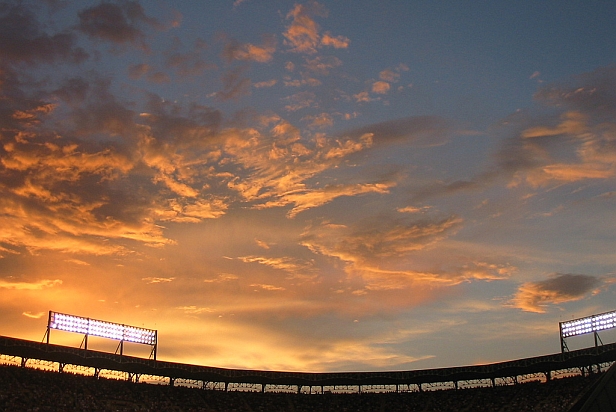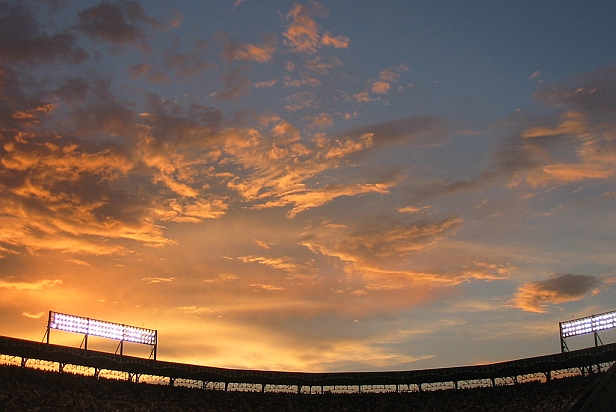 Deceptively clear skies over Rangers Ballpark in Arlington.Courtesy jacorbett70 via FlickrPhysician Robert Cluck spends his mornings working at Arlington Memorial Hospital and his afternoons as mayor of Arlington, Texas, a city of 375,000 that has one of the worst ozone problems in the country. Seeing children with asthma in the emergency room has led him to work against coal-fired power, auto-centric city planning, and other pollution sources. We spoke about how cities can pursue cleaner air and better public health.
Deceptively clear skies over Rangers Ballpark in Arlington.Courtesy jacorbett70 via FlickrPhysician Robert Cluck spends his mornings working at Arlington Memorial Hospital and his afternoons as mayor of Arlington, Texas, a city of 375,000 that has one of the worst ozone problems in the country. Seeing children with asthma in the emergency room has led him to work against coal-fired power, auto-centric city planning, and other pollution sources. We spoke about how cities can pursue cleaner air and better public health.
Q. How does a Texas Republican mayor get involved in clean-air advocacy?
A. I’ll tell you why I’m involved in it so heavily: It’s because I see the ravages of bad air. We’re the largest city in America without a public transportation system. To get anywhere in this city, you have to use an automobile. And every summertime, we begin to see the ozone buildup. Ozone is very toxic to lung tissue. So I can predict, just by going through the ER every morning, how bad the ozone levels are.
We see young kids with severe asthma, who don’t understand why they can’t breathe. But we understand it. I also see chronic lung patients, smokers, whose breathing difficulties are exacerbated by high ozone.
Asthma is the most common health effect we see. But I’m not sure if it’s going to remain that way. As the nation continues with this problem, we may start seeing associations between air quality and other diseases. One of those could be lung cancer.
 City of ArlingtonQ. Where is the most ozone pollution coming from?
City of ArlingtonQ. Where is the most ozone pollution coming from?
A. Automobiles and trucks, by far. I suspect the average family here has two cars, maybe three depending on how old their kids are. There’s pollution from freight trains, which come right through the middle of our city, 10, 12, 15 a day.
We also have, just south of the city, some huge cement kilns. The breeze in the summertime blows all that crap over our city, directly overhead. And there’s pollution from several coal power plants fairly close to Arlington.
I’ll tell you a little story. About three years ago, TXU, the major power company in Texas, said it was going to build 18 or 19 coal-powered plants in Texas, several of them right around here. So we had a meeting at the University of Texas in Arlington, and I invited all the mayors that wanted to talk about solutions for that. Long story short, we really started goring TXU in a big way, and fought those plants.
They finally gave up and only built three. Now, that’s three too many, but we were still able to delete the other 13 {or so}. It was a major David and Goliath fight. Dallas was involved with it, Houston was, and we were very proud of that. So I think power companies now know they’re going to face a mighty big fight if they announce that they’re going to build more coal-fired plants in Texas.
Q. What other solutions is the city working for?
A. We know in Arlington, and in the whole area of North Texas, the problem is the automobile, and there’s going to have to be a shift. So we’re starting by slowly converting our city fleet, everything but police cars, to alternate forms of energy such as hybrids. We can’t do it with police cars because they don’t have enough power. But it will happen one day. And our garbage collection company is contracted to start converting their fleet from diesel to natural gas.
We have built miles and miles of bike trails for people to exercise or get to work on bicycles, and stay healthy also. That has not been very successful yet. People still love their cars.
Q. That would seem to be the kind of thing that a physician-mayor could speak to.
A. I do it all the time. We gave every fifth grader in Arlington, two weeks ago when they got out of school, we gave them a pedometer and asked them to walk 10,000 to 15,000 steps a day. Whoever comes in August having walked the most number of steps, the three top will get to go with me to a Texas Rangers baseball game in a suite. They’re really excited about it. It’s going to take little things like that to get people walking and getting them less dependent on cars.
Q. What’s the key to educating people about this?
A. When I started talking about health, people started paying attention. It was kind of a nebulous thing before then, but when you start talking about public health, or your own health, or your kid’s health, then it becomes more real and you start paying attention. It’s just a natural lead-in to try and get people to do something about it.
Q. Once the city has been built around driving, it seems tough to lay down a bicycle network that’s safe and comfortable. Are there other land-use steps or zoning changes you’re trying to do?
A. Not yet. We were talking yesterday at our council meeting about having to change our perception of land use related to walkability. That’s a tall order, because we’re so spread out. With about 400,000 people in 100 square miles, it’s just not easy to get from one end to the other, even in a car. Certainly a bicycle would be tough.
But University of Texas at Arlington, which has about 28,000 students, is right next door to City Hall. We’re working together to build what we call a “college town,” which is a very walkable, bikeable street with a performance hall. It’s about an $80 million project, and we’re helping with that.
Q. Can you address the ozone problem separately from climate change, or do you have to work on them together?
A. I think there’s a strong association between the two, just like you do, but when I’m talking about public health, I’m talking about breathing 15 times a minute, and pulling all the particles down and getting all the bad effects like asthma.
Q. Is it a political risk to be talking about pollution — something people associate with the Democratic Party? Or is there a benefit to it?
A. I don’t think it’s either one. And I don’t base my conversations on wanting to get reelected. It just doesn’t enter into my thought process.
Q. National Republicans don’t show a lot of interest in addressing air-quality threats, climate or otherwise. What’s the key to persuading them?
A. Once again, it’s a public health issue, and it’s getting people to live longer and healthier, and I don’t think anybody can dispute that.
Q. Do you see steps that cities can take that are both economically smart and also improve air quality?
A. Anything we can do to improve the public health of our cities is an economic benefit, because health-care costs that are high now are probably going to be even more significant in the future. But I don’t really think about it in dollars and cents. I think in terms of living longer and feeling healthier.


